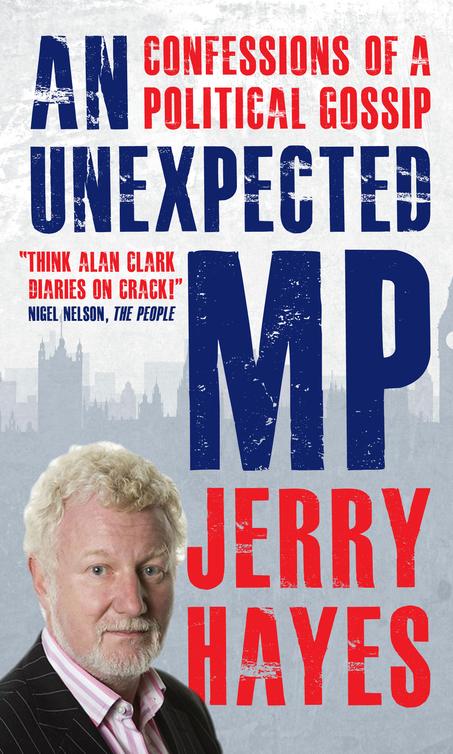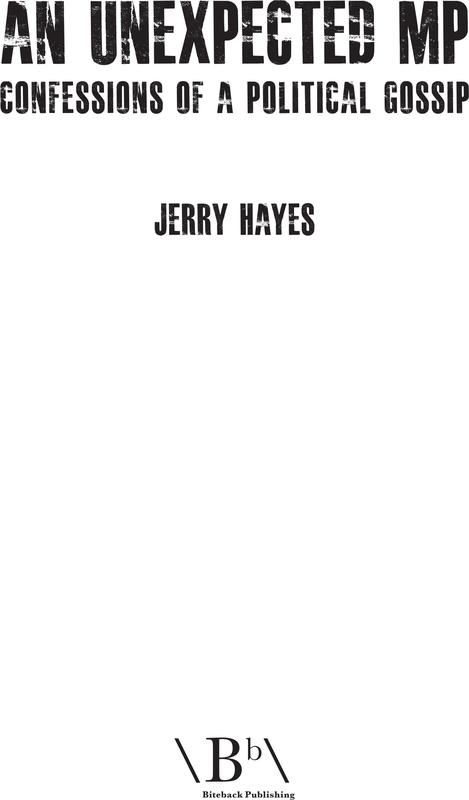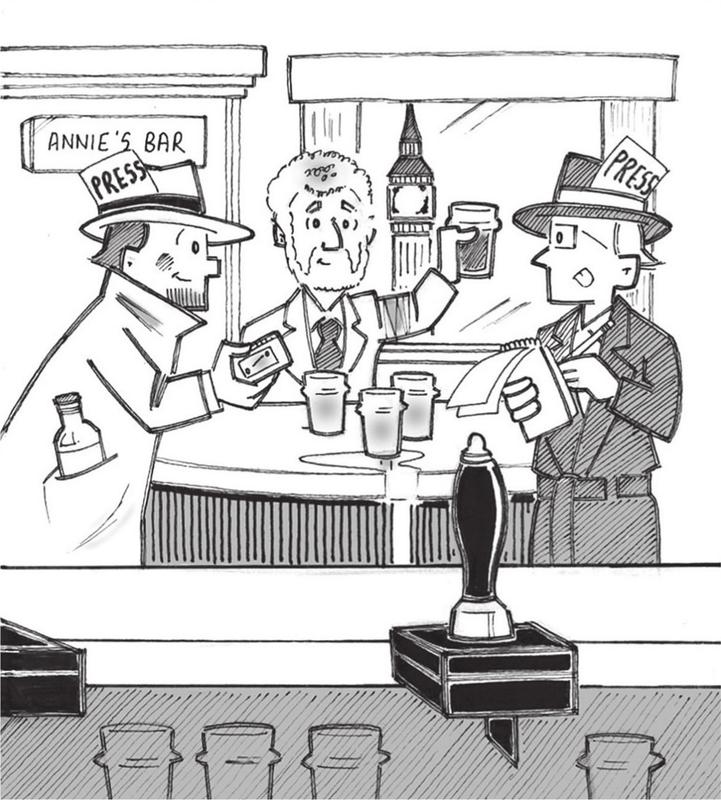An Unexpected MP
Authors: Jerry Hayes



To Doggie, Puppy and Lolly
- Title Page
- Dedication
-
- 1.
In the Beginning - 2.
The Tea Room - 3.
The Chamber - 4.
Annie’s Bar - 5.
Rebellion - 6.
The Constituency - 7.
Big Beasts - 8.
The Junketeers - 9.
Media Tart - 10.
She - 11.
The Miners’ Strike - 12.
Fact Finding - 13.
The Whips - 14.
Her Majesty’s Press - 15.
The Fall - 16.
John Major - 17.
Parliamentary Aide - 18.
The James Whale Show - 19.
The End of the Beginning - 20.
The Press Gallery - 21.
If We Catch You at It, You’re in It - 22.
Back to the Bar - 23.
From the Wilderness -
- Epilogue
- Acknowledgements
- Index
- Copyright

S
ome people enter politics for the noblest of ideals. They want to change the world into a better, kinder and gentler place. They want to save the environment, eradicate child poverty and improve the lot of everyday folk.
For them, politics is all about serving the community.
And then there are those with well-deserved inferiority complexes who want status, power and position. Those who would sell their grannies for a red box and a medium-range family saloon, and who make dreary speeches that no one else wants to make and sign letters that nobody else wants to sign.
Few believe me, but I entered the House of Commons purely by accident. I was in my twenties, doing well at the Bar, and although I’d risen through the ranks of the Young Conservatives I had no desire to be an MP. I have always had a deep suspicion of those who have had an overwhelming desire to get elected since an early age. They tend to have strong views about Europe and gay marriage and harbour an unhealthy interest in the death penalty. They are the ones at Tory Party conferences who spend all their waking hours at fringe meetings with other odd, wild-eyed teenagers with spots and bow ties. And they are the ones who at the end of
it all go home to their mothers’ basements and play Call of Duty until the early hours; that is, when they are not pretending to be thirteen-year-old girls on the internet. They also collect Thatcher memorabilia and regard her every word and deed with the zeal of a creationist preacher.
I was never one of those.
I joined the Young Conservatives for the noblest of reasons and the sort of ideals the Buddha, Gandhi and Mother Teresa would have applauded. It is the motivating force that has made Britain the Mother of all Parliaments and the Empire the envy of the world: a shag.
So I was surprised to be sounded out by one of the party grandees, asking if I would like to stand for selection in Harlow, which was just down the road. I told him he was mad. But he just told me that even if I became the candidate I had no hope of winning. And they were desperate. I wasn’t even on the candidates list.
So that’s why on 9 June 1983 there were two very stunned people in the Harlow leisure centre. I had just defeated the longstanding Labour MP Stan Newens and had a majority of a little over 3,000. And I hadn’t a clue what to do. I had just turned thirty.
In those days there was no induction into Parliament. No little booklet of helpful hints. No mentoring. I just sat at home and waited for the post. Sure enough, after a day, an envelope with the Crowned Portcullis logo appeared on paper that would have made the Andrex puppy proud. It was headed ‘The Whip’ and telling me to roll up to Committee Room 14 and not to be late.
The next day I proudly introduced myself to the policeman
at Carriage Gates and encountered the first of many Westminster Catch-22s that were to dominate my life.
‘And how can I help you, young man?’
‘Actually, I’m an MP.’
‘That’s what they all say. Where’s your pass? I thought not. Now bugger off.’
After twenty minutes of intellectual discussion he eventually understood that before I could get a pass I had to be allowed access to the pass office.
Well, at least I didn’t call him a pleb.
So, with all the other newbies of ’83 I entered the cavern that is Committee Room 14. Here I would see the full majesty of power and my sticky little fingers would be tantalisingly close to the controls.
In my dreams. The Chief Whip gave cursory congratulations, then reminded us that our job was to support the government and that our area whips would tell us how to vote. If you had views, get rid of them now. We were now part of Maggie’s barmy army. At ease.
I looked around the room. Most seemed fairly normal, but there were a few who looked as if they had just escaped from the
Star Wars
bar. This was going to be an interesting five years.
And who was going to give me my opinions? A delightful man who in those days always dressed in grey suits. I was told that he was the most popular man in the Commons, without any enemy on the radar screen. His name was John Major. How things would change.
My first task was to collect my adulatory mail. When I look back I realise how unspeakably bumptious I must have
been. The truth is that I was desk-less, secretary-less and utterly clueless. I entered the Commons post office with a cross between a swagger and a pimp’s roll. I’ll never forget my first letter: it was a congratulatory note and cheque from the Cooperative Society.
Dear Mr Hayes,
What wonderful news. We look forward to working with you in promoting the Socialist cause. Please accept £100 towards your campaign.
Was it my beard? My youth? Was it something I had said?
But it was going to get worse. Making a beeline for me were two middle-aged gentlemen. Hands were extended.
‘Congratulations,’ they chirped, ‘welcome to the House; may you have many happy years. By the way, have you found yourself a pair?’
I hadn’t a clue what they were talking about until they explained that it meant teaming up with a member of the opposite party on unimportant votes to cancel each other out. Having a pair would excuse attendance.
Now I was becoming a little confused.
‘But aren’t you guys Conservatives?’
‘Of course we are, that’s why you can choose which of us to pair with!’
‘But I’m a Tory too!’ I exclaimed, puffing out my pathetically self-important chest.
This news was about as welcome as a rat sandwich to Nick Budgen and Douglas Hogg, who then turned on their heels in search of a real Labour MP.
Then I recognised a familiar face. David Mellor. He was a junior minister. I introduced myself.
David isn’t always as nice as he looks. In those days he gave the impression of being the school swot who had just shagged the headmaster’s daughter. And his suits always looked as if he had left the coat hanger in. He looked at me as though he had discovered a new species of bug. And when it comes to sneering he can teach George Osborne a thing or two and make Ed Balls seem a man of charm and sensitivity.
‘Mmm,’ he hissed, ‘don’t suppose you are a new Tory MP, are you?’
Thank God. Recognition at last!
‘Yes,’ I smiled excitedly.
‘Good,’ he grunted, as he punched me playfully in the stomach, and swaggered off like Flashman on crack, muttering, ‘It’s always good to hit a new Tory MP on the first day.’
Years later when Mellor was outed for having an affair with some actress we nicknamed Olive Oil, a knight of the shires showed me a newspaper cutting with a photo of the bedroom where the trysts had taken place. The scene was not one from
Romeo and Juliet
, but a grimy mattress and an empty bottle of sherry. The old boy was not at all happy, his red face quivering with rage. ‘What a bloody disgrace. He’s let the party down. The man’s a bounder!’
‘Well, it’s only a shag!’ I exclaimed.
‘Silly boy,’ boomed my knight. ‘I don’t care about her or that foul pit. Just look at that bloody bottle. Cyprus sherry. And he calls himself a Tory. He’s got to go.’
But despite Mellor’s inability to pass a belt without kicking below it, I grew to rather like him. In the dying days of
Thatcher, when the massed graves of her enemies were being danced on by her peculiars, I asked Mellor what it was like being a minister in such turbulent times. ‘God!’ he exploded. ‘It’s like being in the OK Corral. The woman is shooting at everything that moves.’
The time had come for me to share my great political insights with my new colleagues, so I marched into the Smoking Room – in those days, a Tory watering hole. There, Julian Amery, a fellow with such a plummy voice and impressive war record it was said that he was born with a silver hand grenade in his mouth, was holding court. I went to introduce myself, with no doubt that he had been awaiting my arrival with a keen interest.
‘Dear boy, please don’t bother. I haven’t bothered to learn a Tory MP’s name since 1964’ was perhaps not the warm response I had expected. He then threw up on the carpet, called for a waiter to clear up and ordered another large brandy.
It was the first of many put-downs which sensibly planted my feet back on the ground. The simple truth dawned on me that I may be an MP, but I knew next to nothing. And did the government want me for my great policy ideas? Of course not. I was just meant to troop through the right lobby at the right time. What I find so depressing is that so many of the 2010 intake take themselves far too seriously and give a very good impression of being firm believers in an Onan Nation Society.
The Smoking Room is a place where a young Member can learn a lot from the old stagers. To sit at the feet of Harolds Wilson and Macmillan and listen to their war stories was a privilege. And there was never a queue, as those in their second parliament had heard them all before.
One evening I joined a jolly group, one of whom was a lovely man called Richard Holt. Poor old Richard was not blessed with matinee idol looks: he was a large man with snaggle teeth and a red face which looked as if it had been carved out of a lump of Spam. As a director of William Hill, he always had a wad of £50 notes the size of a baby’s head in his back pocket. To be honest, I can’t remember who else was there, but we were all enjoying a good laugh when George Brown, former deputy leader of the Labour Party, swayed in our direction. He was rather drunk. Nothing new, then.
‘May I join you wicked Tories?’ he slurred. And down he slumped.
He eyed us all one by one. And then his gaze fell upon Holt.
‘Who’s that ugly bugger?’ he enquired.
We explained and then enjoyed a rather surreal conversation with a political legend. Brown staggered to his feet to leave us and paused to impart what we were expecting to be words of great wisdom which we would remember for the rest of our lives. Brown swayed towards Holt, pointing a pudgy finger. The moment had come.
‘And as for you, Holt, you’re the ugliest cunt I’ve ever met.’ At that, he left us: turned, waved, smiled and bumped into the door.
But this was only the beginning of fourteen years of delightful, bizarre and improbable experiences in the Commons and, later, the press. And that is what this book is really about. The people, the gossip and the sheer insanity of it all. In politics, what doesn’t kill you makes you stranger.

One story, from a few years later, should set the scene for what is to follow. In the late 1980s, Colin Moynihan, an Olympic gold medallist cox, thought up a wheeze to raise money for charity. We were to have a parliamentary regatta. In theory this was a fine idea, but in reality putting elderly, infirm, unfit and mostly drunk MPs into rowing boats for a race in the most dangerous part of the Thames is a potential disaster. Health and safety would never allow it today. Insurance companies would roll their eyes in horror. To make matters more interesting, the event was sponsored by Beefeater Gin, who provided a free gin tent on the terrace. It was staffed by very pretty girls dressed as beefeaters in miniskirts. Very mini skirts. Free gin, MPs and pretty young girls in short skirts are a dangerous mix. Particularly when it was discovered that one of the lovelies was, in the interests of keeping up morale, administering blowjobs round the back of the tent. This had the makings of a perfect day, but Nature and Margaret Thatcher, for once, joined forces.
There was a very strong tide, which made it very difficult to row up to the starting point. Even more difficult if you have never been in a racing rowing boat before and damn near impossible if you have spent all afternoon being served free gin by the Beefeater lovelies. Things were not made any easier when Thatcher decided to muscle in. The water was choppy, the tides dangerous and one policewoman had fallen in and been sucked under Westminster Bridge. But Thatcher’s publicity boys came up with a brilliant idea. Enthrone her on a steam boat renamed
No Turning Back
and let her make royal progress among the boats. This would have worked rather well if she wasn’t always in such a bloody hurry. Thatcher appeared Boudicca-like on her yacht, which was going so fast that the
wake sank Jim Callaghan’s boat, raising all sorts of nightmare scenarios. Quite how nobody was killed or seriously injured on this day is a total mystery.
But for me, things got worse.
I can’t remember who won my race, as my only goal was to stay alive. In celebration of survival I thought it would be rather a good idea to prop up the gin tent bar some more. After a few more noggins I encountered a panic-stricken whip. There was a debate on South Africa and everyone was either at the regatta or in the gin tent and incapable of speech let alone making one. As I could at least walk mostly unaided and was moderately coherent I was ordered into the chamber to say a few helpful words as I had recently returned from South Africa. Mercifully, in those days there were no television cameras in the chamber. But what made my bowels turn to water was the sight of Thatcher steaming onto the front bench to listen.
I have never had the nerve to read what on earth I said. But by the scowl on her face it appeared that my comments about the ‘evil regime’ did not go down a treat.